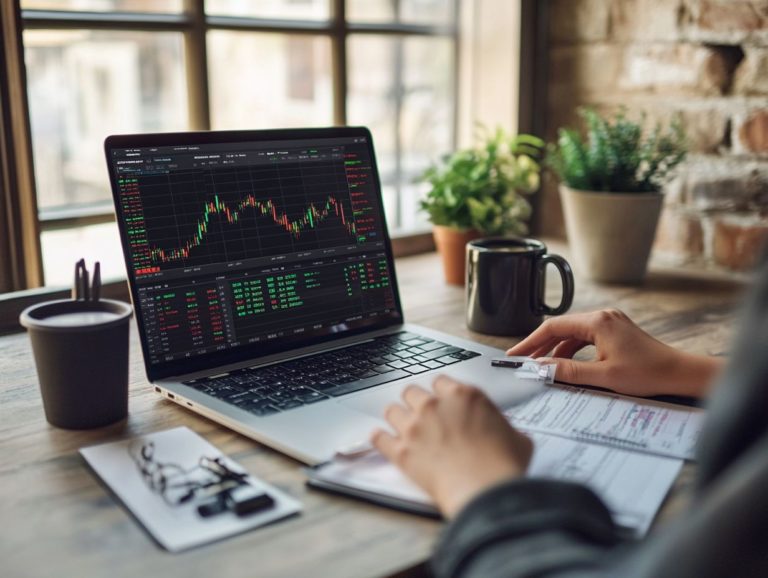5 Best Books on Trading Psychology to Read
Trading transcends mere charts and numbers; it s a sophisticated mental game that demands emotional resilience and acute self-awareness. Understanding the psychological facets of trading can be the decisive factor between triumph and defeat. This article unveils five essential books that explore trading psychology, drawing wisdom from esteemed authors such as Mark Douglas and Carol Dweck.
It examines the common psychological traps traders encounter and offers strategies to navigate these challenges. By seamlessly incorporating these insights into your trading plan, you can set yourself up for enduring success.
Get ready to transform your trading mindset and achieve incredible results!
Contents
- Key Takeaways:
- 1. “Trading in the Zone” by Mark Douglas
- 2. “The Disciplined Trader” by Mark Douglas
- 3. “Mindset: The New Psychology of Success” by Carol Dweck
- 4. “The Psychology of Trading” by Brett N. Steenbarger
- 5. “Market Mind Games” by Denise Shull
- Why Is Understanding Trading Psychology Important for Traders?
- What Are the Common Psychological Traps That Traders Fall Into?
- How Can These Books Help Traders Overcome Psychological Barriers?
- What Are the Key Lessons and Strategies Outlined in These Books?
- How Can Traders Incorporate These Lessons into Their Trading Plan?
- What Are the Long-Term Benefits of Improving Trading Psychology?
- Frequently Asked Questions
Key Takeaways:

- Mastering trading psychology is essential for success in the markets.
- These books offer valuable insights into understanding and overcoming common psychological traps that traders fall into.
- By incorporating the lessons and strategies outlined in these books, traders can improve their trading plans and achieve long-term success in the markets.
1. “Trading in the Zone” by Mark Douglas
“Trading in the Zone” by Mark Douglas delves deeply into the nuances of trading psychology. It emphasizes the mental skills you must master to cultivate consistent success, especially in stressful trading situations.
Douglas clearly articulates the importance of emotional control, illustrating how your mindset can significantly impact decision-making. By examining common psychological traps, he gives you the power to adopt a disciplined approach to trading.
He provides practical strategies to tackle the emotional hurdles you may encounter, urging you to understand market behaviors more comprehensively. This holistic perspective not only enhances your trading performance but also builds a resilient psychological foundation.
As you embrace these insights, you’ll find yourself better equipped to navigate the chaotic nature of the markets while maintaining the clear, focused mindset crucial for long-term success.
2. “The Disciplined Trader” by Mark Douglas
“The Disciplined Trader” by Mark Douglas stands as a cornerstone in the realm of trading literature. It focuses on the pivotal skills of discipline and emotional intelligence necessary to navigate the complexities of financial markets.
The book delves deeply into psychological strategies, highlighting the necessity of managing emotions during high-stress trading scenarios. By cultivating a resilient mindset, you can effectively counter the fear and greed that often cloud your judgment. Douglas lays out specific behavioral rules to enhance your decision-making skills, such as creating clear trading plans and adhering to consistent routines.
Practicing these strategies boosts your confidence and elevates your trading performance, allowing you to approach the markets with increased clarity and composure. Ultimately, by mastering your emotional landscape, you position yourself for long-term success in trading.
3. “Mindset: The New Psychology of Success” by Carol Dweck
Mindset: The New Psychology of Success by Carol Dweck offers profound insights into how cultivating the right mindset can transform your personal and professional journey, particularly in trading.
Dweck explains two fundamental categories of mindset: the fixed mindset, where individuals perceive their abilities and intelligence as unchangeable, and the growth mindset, which embraces the idea that skills and talents can be honed through effort and perseverance.
For traders, these contrasting viewpoints can lead to vastly different approaches to risk and failure. By adopting a growth mindset, you create an invaluable space for learning from your mistakes, fostering emotional resilience that allows you to navigate the inevitable fluctuations of the financial markets with greater composure.
Ultimately, embracing this adaptive mindset gives you the power to make more rational and informed decisions, enhancing your overall financial outcomes and paving the way for lasting success.
4. “The Psychology of Trading” by Brett N. Steenbarger

“The Psychology of Trading” by Brett N. Steenbarger offers you a profound exploration of the thought patterns that shape trading behavior. It provides invaluable insights for elevating your performance in the financial markets.
As you dive into the intricate thinking process in trading, you ll discover how emotional responses profoundly impact your decision-making. The book highlights how important it is to identify self-awareness and emotional regulation, showing you how to leverage psychological insights to navigate market volatility with greater efficacy.
Steenbarger encourages you to pinpoint your emotional triggers and adopt effective strategies for managing anxiety and fear. By embracing this approach, you can enhance your trading performance and cultivate resilience, transforming psychological hurdles into opportunities for growth and mastery in your trading journey.
5. “Market Mind Games” by Denise Shull
Market Mind Games by Denise Shull invites you to explore the psychological strategies that can help you navigate the emotional rollercoaster of market dynamics. It also addresses volatility.
The book underscores the significance of identifying common mental traps that might derail your trading strategy, such as fear, greed, and overconfidence. You can learn to control your emotions effectively and maintain your composure even when the pressure is on.
Shull provides actionable recommendations, including mindfulness practices and self-reflection exercises, designed to cultivate your psychological resilience. This gives you the power to understand your emotional triggers and respond to market fluctuations with clarity and confidence.
Ultimately, these insights will elevate your decision-making process and enhance your overall trading performance.
Why Is Understanding Trading Psychology Important for Traders?
Understanding trading psychology is essential for you as a trader, as it encompasses the mental aspects that influence your financial decisions, emotional balance, and ability to navigate market behavior. This understanding is a key ingredient for achieving consistent trading success.
By honing your psychological skills, you can significantly elevate your decision-making abilities. This enables you to make calculated, rational choices instead of falling prey to impulsive reactions driven by fear or greed.
Mastering your emotions becomes crucial, especially when executing trades during periods of heightened market volatility. As you cultivate greater emotional resilience and self-awareness over time, you not only enhance your performance but also develop a sustainable trading approach.
Embracing these psychological insights can lead to transformative changes in how you perceive challenges and opportunities, ultimately fostering a more prosperous trading journey.
What Are the Common Psychological Traps That Traders Fall Into?
You often find yourself facing common psychological traps that can derail your trading performance, such as the fear of loss, overconfidence, and the struggle to manage your emotions in high-pressure situations.
These mental pitfalls can significantly skew your decision-making. They can lead to impulsive actions that dismiss well-thought-out strategies. For example, the fear of loss might prompt you to exit a position prematurely, causing you to miss out on potential gains.
On the other hand, overconfidence can lead you to underestimate the risks tied to certain trades. To tackle these challenges, you can adopt rigorous self-assessment techniques.
Maintaining a trading journal to document your emotions and outcomes is one effective method, as is setting realistic goals that foster discipline. By recognizing these traps and committing to personal growth, you can enhance your psychological resilience and, ultimately, elevate your trading success.
Start your reading journey today and take control of your trading future!
How Can These Books Help Traders Overcome Psychological Barriers?

Influential books on trading psychology serve as invaluable resources that help you overcome psychological barriers. They provide insights into emotional control and effective psychological strategies, debunking the top 5 myths about trading psychology.
By exploring concepts like cognitive biases the ways we think that can lead us to make poor decisions and the effects of fear and greed, these texts equip you with actionable techniques to maintain discipline, especially in volatile market conditions.
You can learn to incorporate mindfulness practices that allow you to pause and evaluate your emotional responses before making decisions. This helps reduce impulsive trading behavior.
These works emphasize the necessity of having a structured trading plan, which lays the groundwork for building confidence and consistency in your trading endeavors. Through dedicated self-reflection and journaling, you can identify and challenge your thought patterns. This ultimately nurtures a more resilient mindset that paves the way for long-term success.
What Are the Key Lessons and Strategies Outlined in These Books?
The key lessons and strategies highlighted in these influential books underscore the significance of emotional intelligence, psychological insights, and disciplined trading practices for success in the financial markets.
These resources provide invaluable guidance on how to manage your emotions and cultivate a growth-oriented mindset. This helps you remain resilient amid the inevitable ups and downs of trading.
By enhancing your self-awareness and utilizing techniques like mindfulness and cognitive restructuring, you can navigate the psychological challenges that often arise in volatile environments.
This approach encourages you to adopt a proactive stance toward risk management and stress reduction. It ensures you maintain clarity in your strategies and adaptability in your execution.
By integrating these psychological strategies into your daily routine, you will see a real boost in your overall performance and consistency in achieving your trading goals.
How Can Traders Incorporate These Lessons into Their Trading Plan?
You can effectively integrate insights from psychological literature into your trading strategy by applying bespoke psychological techniques that enhance your decision-making skills and emotional resilience.
Start by establishing clear, actionable goals that resonate with these insights. This lays a solid foundation for a structured trading approach.
Next, prioritize the development of consistent habits that emphasize discipline. Schedule regular review sessions to evaluate your past trades and uncover behavioral patterns.
This practice boosts your emotional control and sharpens your risk assessment skills. Embrace continuous self-assessment as a vital part of your routine. This enables you to adapt your strategies and habits in response to market fluctuations and your personal performance.
This journey helps you develop a strong trading mindset that sets you apart from others.
What Are the Long-Term Benefits of Improving Trading Psychology?
Improving your trading psychology brings long-term benefits, including enhanced resilience techniques, better emotional control, and a greater chance of achieving consistent trading success.
As you cultivate a deeper understanding of your emotional responses to market fluctuations, you ll find yourself making more rational and informed financial decisions, particularly during volatile periods.
This awareness not only helps you mitigate impulsive reactions but also allows you to view losses as valuable learning experiences rather than mere setbacks.
The insights you gain from understanding your psychological patterns can spark a significant personal transformation. This enables you to develop a more disciplined approach to trading.
Ultimately, prioritizing your psychological well-being becomes a cornerstone of mastering the market. This paves the way for sustained profitability and growth in your trading career.
Frequently Asked Questions

To gain more insights, consider exploring the recommended books further or applying the lessons learned here to enhance your trading journey.
What are the 5 best books on trading psychology to read?
- “Trading in the Zone” by Mark Douglas
- “The Disciplined Trader” by Mark Douglas
- “Market Mind Games” by Denise Shull
- “Trading Psychology 2.0” by Brett N. Steenbarger
- “The Psychology of Trading” by Brett N. Steenbarger
No matter your experience level, these books are a must-read!
Why are these books considered the best for trading psychology?
These books are highly regarded because they are authored by experienced traders and psychologists. They provide unique insights into the psychological aspects of trading, including common misconceptions about trading psychology.
Each book offers practical strategies and techniques to help traders deal with their feelings and thoughts, which are crucial for success in the market.
What can I learn from these books?
These books cover various topics related to trading psychology.
- Managing fear and greed
- Developing discipline and self-control
- Understanding market cycles
- Improving decision-making skills
They also include real-life examples and case studies to help you apply the concepts in your own trading.
Who should read these books?
These books are valuable for traders of all experience levels. They also benefit anyone interested in the psychology behind trading and its impact on market movements.
Are these books only for traders?
No, these books are also useful for investors, financial advisors, and anyone involved in the financial industry.
The concepts discussed can be applied to various aspects of finance and help individuals make better investment decisions.
Where can I find these books?
You can find these books widely available online and in bookstores. They can also be purchased as e-books or audiobooks for convenience.
You might also discover some of these books at your local library.
Summary
These essential books on trading psychology equip you with the tools you need to navigate the emotional challenges of trading. Start your journey with these insightful resources, including the 5 key concepts of trading psychology, and your trading success awaits!






